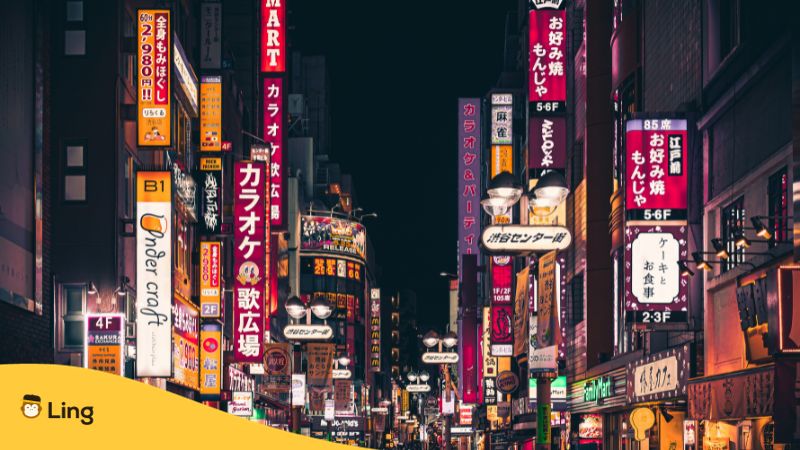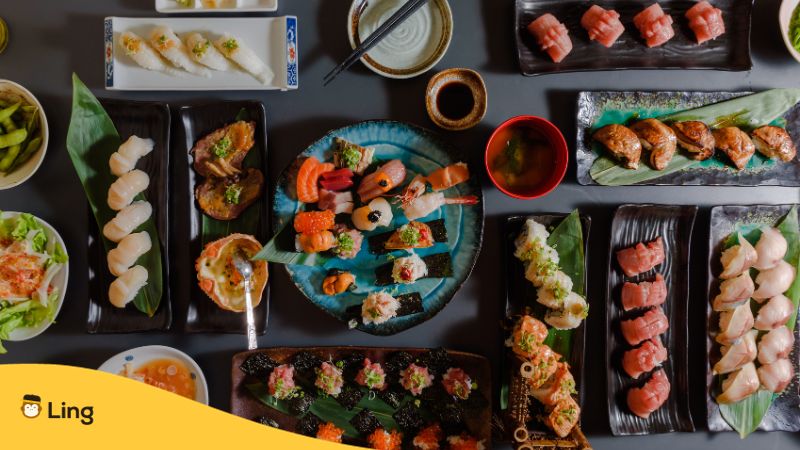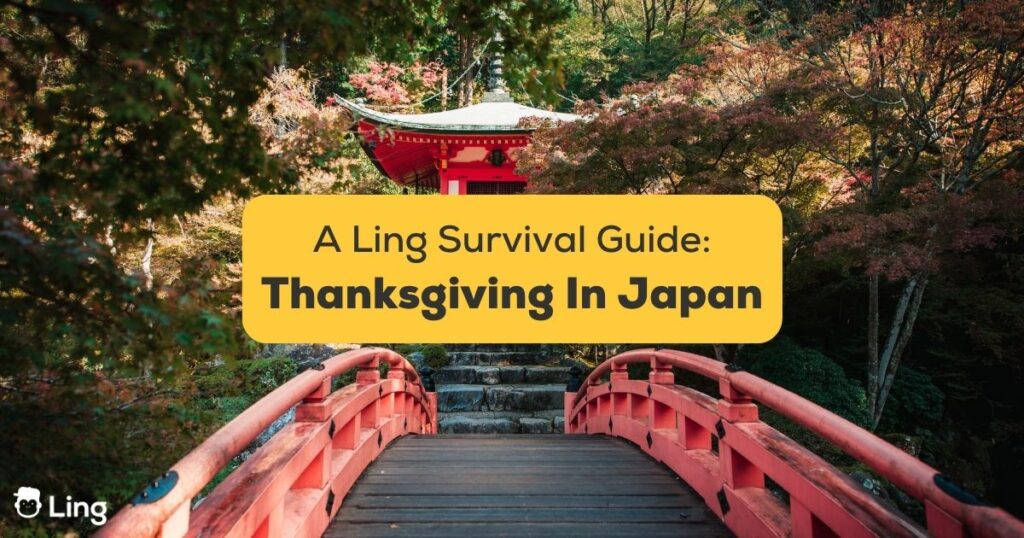If you’re planning an upcoming vacay to Japan or are just straight-up obsessed with the Japanese language and culture. You’ll wanna mark November 23rd in your calendars because that’s when they celebrate Kinrō Kansha no Hi (勤労感謝の日) – also translated as the day for Thanksgiving in Japan! This special national holiday is for showing mad appreciation to all the hard-working hunnies in Japan. Kinda like how Thanksgiving back home gives us a chance to give thanks, be grateful, pig out on some bomb food, and relax with fam and friends.
Now Labor Thanksgiving Day didn’t originate from those first feast vibes like back in 1621. It actually has roots in ancient Shinto harvest festivals and Buddhist traditions! It’s pretty neat how it brings that OG gratitude energy into the modern day. When November 23rd rolls around, peeps across Japan take some time to reflect, as well as show some love to the dedicated workers who make the country so dope. We’re talking parades, fireworks shows, chill temple visits, and smashing bento meals with coworkers!
So, if you find yourself exploring Japan near late November, make sure to get hyped for this fire holiday! Join in the festivities any way you can, or just say a cheerful Otsukaresamadeshita (お疲れ様でした) to locals. This is a great way to show them how much you, as a gaijin, know about the Japanese culture too!
Ready to learn? Keep scrolling for everything tourists and soon-to-be expats should know about celebrating this special day!
Table Of Contents

What Is Kinrō Kansha No Hi?
Kinrō Kansha no Hi translates directly to Labor Thanksgiving Day in English. It’s a national holiday in Japan celebrated annually on November 23rd, with historical origins dating back over 2,000 years!
The holiday started as an ancient Shinto harvest festival called Niinamesai (新嘗祭), which focused on celebrating the autumn rice harvest. Over centuries, it evolved into a revered event for showing appreciation for each year’s hard work through community feasting, dancing, music, and worship of the crops.
Though the core spirit of gratitude remained, the day was not formally established as Kinrō Kansha no Hi until 1948, post-WWII. The new Constitution expanded workers’ rights, so it became Labor Thanksgiving Day – a holiday specially designed to honor all diligent workers across industries.
In modern times, Labor Thanksgiving Day sees most companies and schools shut down across Japan. Back in the day, families gather to enjoy holiday dishes and attend public celebrations, holding parades, fireworks, and more for the nation’s hardest workers. Today, the locals are more likely to spend the day visiting temples, joining the Nagano Ebisuko Fireworks Festival, participating in the Nagano Labor Festival, or staying at the local parks along with their family members.
In some schools, they also hold special activities to teach students about the importance of labor and appreciation. But if we’re talking about schools in the suburbs of Tokyo, don’t be surprised to see random elementary school-age children presenting their drawings, letters, and handicrafts to local police officers during this day as well!

Common Food For Thanksgiving In Japan
While Kinrō Kansha no Hi is not celebrated with a feast like American Thanksgiving, delicious food still takes center stage! Families across Japan prepare special meals on this day to mark the holiday. Instead of turkey and pumpkin pie, some traditional Japanese cuisine often served on Labor Thanksgiving Day includes:
- Sashimi (刺身) – Thinly sliced raw seafood like tuna or salmon. This fresh delicacy is a popular appetizer or side.
- Tempura (天麩羅) – Seafood like shrimp or vegetables dipped in batter and deep fried for a crispy treat. An indulgent main dish.
- Sushi (寿司) – Vinegared rice topped or rolled with fish, egg, veggies, and more. A sushi spread makes a visually stunning meal.
- Udon (うどん) – Hot wheat noodles in a savory dashi broth with chops of vegetables or fried tofu. The perfect comforting, slurpable dish.
- Mochi (もち) – Soft, sticky, subtly sweet rice cakes. Mochi makes for a light dessert or snack to nibble on.
While the flavors are completely different from a turkey feast, Japanese cuisine is a delightful way to honor Labor Thanksgiving Day based on regional food traditions.
Difference Between Japan And Western Thanksgiving
While Kinrō Kansha no Hi translates directly to Labor Thanksgiving Day, it has some critical differences from the Thanksgiving holiday celebrated in Western countries like the United States and Canada.
The main contrast is that Labor Thanksgiving Day is focused especially on honoring diligent workers rather than generally giving thanks for the autumn harvest. Japanese families do not follow traditions like eating turkey, watching football, or shopping sales on the day after either.
The holiday also has more historical roots in rice harvesting festivals from ancient Shintoism rather than any association with early Protestant settlers. Activities often lean more towards temple visits, public parades, and reflective time off rather than large home feasts.
There are also no grand stories of cooperation between indigenous groups and European colonists that are told about the first Thanksgiving meal in North American history. Kinrō Kansha no Hi sprung up differently as an evolution of centuries of rice veneration before being formally established to support workers.
While both cultural holidays value community, gratitude, special dishes, and quality time with loved ones, Japan’s Labor Thanksgiving holiday has shaped those elements around respecting workers and nourishing the country’s prosperity. The focus lies more on labor than general blessings.
At their core, however, both holidays remind societies to slow down, be thankful, and show appreciation no matter the history or traditions!

Japanese Thanksgiving Phrases
Planning to be in Japan for Kinrō Kansha no Hi on November 23rd? You’ll want to know some of these helpful holiday phrases to better connect with locals on this special day celebrating workers’ diligent efforts:
- Arigatō gozaimasu (ありがとうございます) – The standard polite way of saying “thank you” in Japanese. Great for showing everyday gratitude.
- Dōmo arigatō gozaimasu (どうもありがとうございます) – Translates to “thank you very much.” Use to emphasize your appreciation.
- Otsukaresamadeshita (お疲れ様でした ) – Meaning “thank you for your hard work.” Perfect for the labor holiday!
- Iroiro arigatō gozaimashita (いろいろありがとうございました ) – Says “Thanks for everything” to express broad gratitude.
- Gokurousama (ご苦労様) – Wishing someone recognition for their efforts by saying, “Good work!”.
There are also more formal phrases travelers may hear locals using:
- Osore Irimasu (御礼申し上げます) – Special thanks for honored guests/hosts.
- Haisha Moushiagemasu (拝謝申し上げます) – Deep gratitude for someone of lower status.
Use these wonderful Japanese Thanksgiving phrases to share meaningful appreciation between cultures in celebrating the Kinrō Kansha no Hi!
Ready To Join The Japanese Labor Thanksgiving Day?
As we’ve discovered, Kinrō Kansha no Hi is a meaningful part of Japanese culture – honoring diligent workers through ancient harvest celebration traditions adapted to modern times. By taking part in the festivities and customs around this time, travelers can gain insight into the values of duty, community, and gratitude in Japan.
If you want to travel to Japan and immerse yourself in traditions like Kinrō Kansha no Hi, first build language and cultural fluency! The Ling app makes learning Japanese whenever and wherever easy with fun, interactive audio lessons and study tools. Try Ling for FREE now!


































































